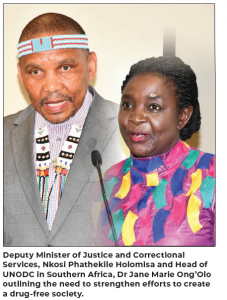
The African Union’s Department of Health, Humanitarian Affairs and Social Development (HHS) hosted a 2-day catalytic Drug Demand Reduction meeting for South Africa’s Traditional Authorities and Leadership on 1 – 2 November 2022 at the Southern Sun Hotel O.R. Tambo International Airport, in Gauteng, South Africa. The session was organised in collaboration with the Department of Correctional Services; the Office of Global Programmes and Policy, Bureau of International Narcotics and Law Enforcement Affairs, a State Department in the United States of America; and United Nations Office on Drugs and Crime (UNODC) under the theme: “Solidarity in addressing drug addiction and related mental health disorders”.
The purpose of the event was to understand public health problems in jurisdictions under traditional leadership due to increased availability and use of psychoactive substances that are trafficked and also produced locally, and to create a national network of Traditional Leaders to facilitate implementation of drug action plans.

South Africa’s criminal justice system, which the Department of Correctional Services (DCS) is an essential component thereof, plays an important role in efforts to fight crime and eradicating substance abuse in and beyond African shores. DCS’ core mandate is to promote a just, peaceful and safe society by ensuring that the corrections environment is secure, safe and humane, and that offenders are rehabilitated to reduce their likelihood of reoffending. Amongst stakeholder’s present were representatives of the National House of Traditional and Khoisan Leadership, the Central Drug Authority (CDA), South African National Aids Council, Department of Social Development, International Technology Transfer Centre and others who presented various mechanism that can be used to realise a drug-free environment, particularly within jurisdictions under Traditional Leadership in South Africa.
The session also provided an opportunity for a ‘Royal tête-à-tête’ in a form of a closed group discussion by Traditional Leaders to define their role in the Drug Demand Reduction Architecture of South Africa.
In his address, Deputy Minister Nkosi Phathekile Holomisa said that the African continent is the hub for illicit drugs trafficking, adding that the international criminal network uses the region as a transit redistribution centre. He decried the fact that the continent continues to be a growing destination of choice for illicit cultivation, production and clandestine manufactures of drugs. “The issue of substance abuse is also exacerbated by high the unemployment rate and climate change which affect the condition of our resources,” said Holomisa. With the advancement of technology, people in the rural areas have access to information that can either improve or destroy their lives, hence the importance of the involvement and participation of Traditional Leaders, as guardians and promoters of the socio-economic wellbeing of the people, in initiatives to curb harmful effects of drug infiltration in communities.
Deputy Minister Holomisa emphasized that DDR deserves special focus because research shows that there is a direct correlation between drugs and substance abuse and the scourge of Gender-Based Violence (GBV). “The resolutions that were taken during the Dialogue with Traditional Leaders on GBV and Drug prevention convened in Polokwane by UNODC on 3 August 2022, where we resolved among others:
· To expand access to justice for women;
· To use our authority and influence to launch social mobilisation campaigns to raise awareness and to strengthen prevention and response to GBV;
· To encourage Female Traditional Leaders to help with Increased reporting, referral and support to GBV cases; and
· To develop protocols and guidance document required for effective and comprehensive programme.
The reason we came here is to further confirm our commitment as Traditional Leaders working alongside the government departments and agencies that we are part and parcel of the solution,” enunciated Nkosi Holomisa.
Head of the UNODC in Southern Africa, Dr. Jane Marie Ong’olo said that drug use is increasingly moving from towns and urban areas to the village community. She mentioned that it is important to involve everyone as resolving the drug problem is a common and shared responsibility. She further stated that the majority of the people in South Africa access services through traditional leadership, hence it was very crucial to begin to have a discussion with Traditional Leaders regarding substance abuse. “We saw the need to update and educate Traditional Leaders about the tools that they can use against substance abuse. This meeting was also aimed at joining the Traditional Leaders with all the relevant stakeholders that are here, that can assist them on how to be fast responders,” said Ong’olo. She further stated that this is history in the making as such meeting has never taken place in Africa.
Traditional leaders and all stakeholders present signed a pledge to commit themselves to activities that will help eradicate drug abuse.
